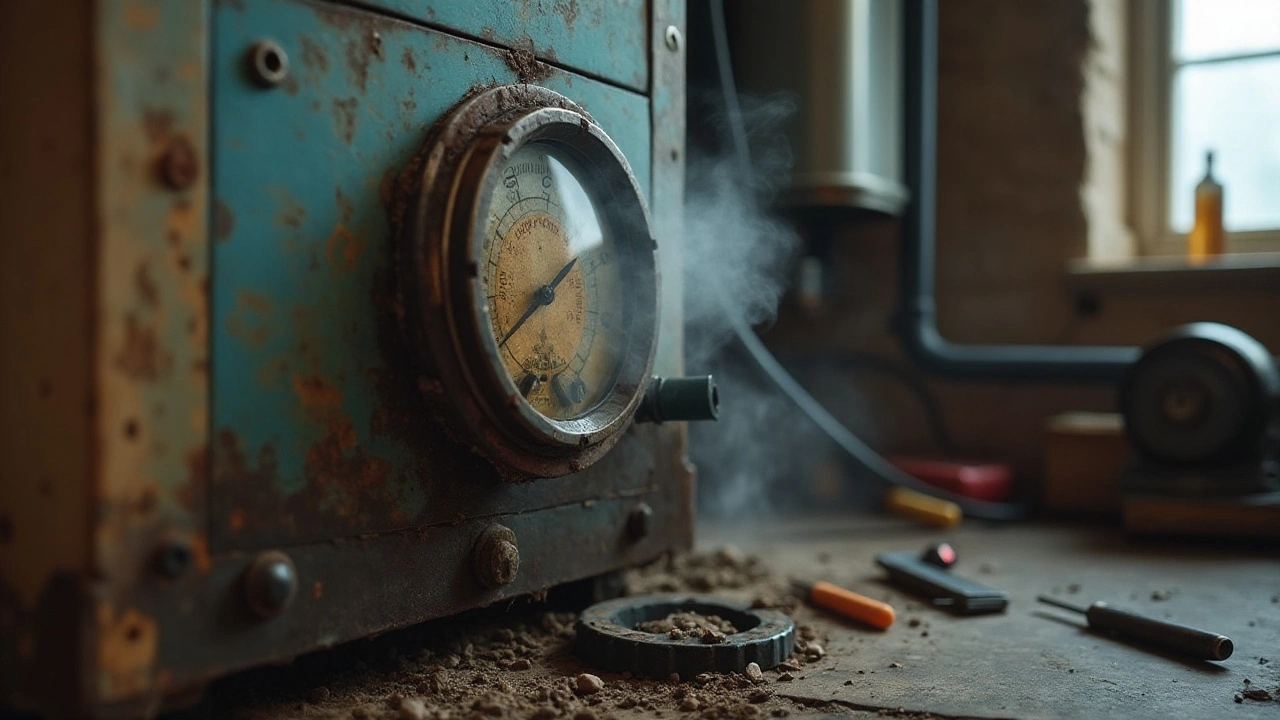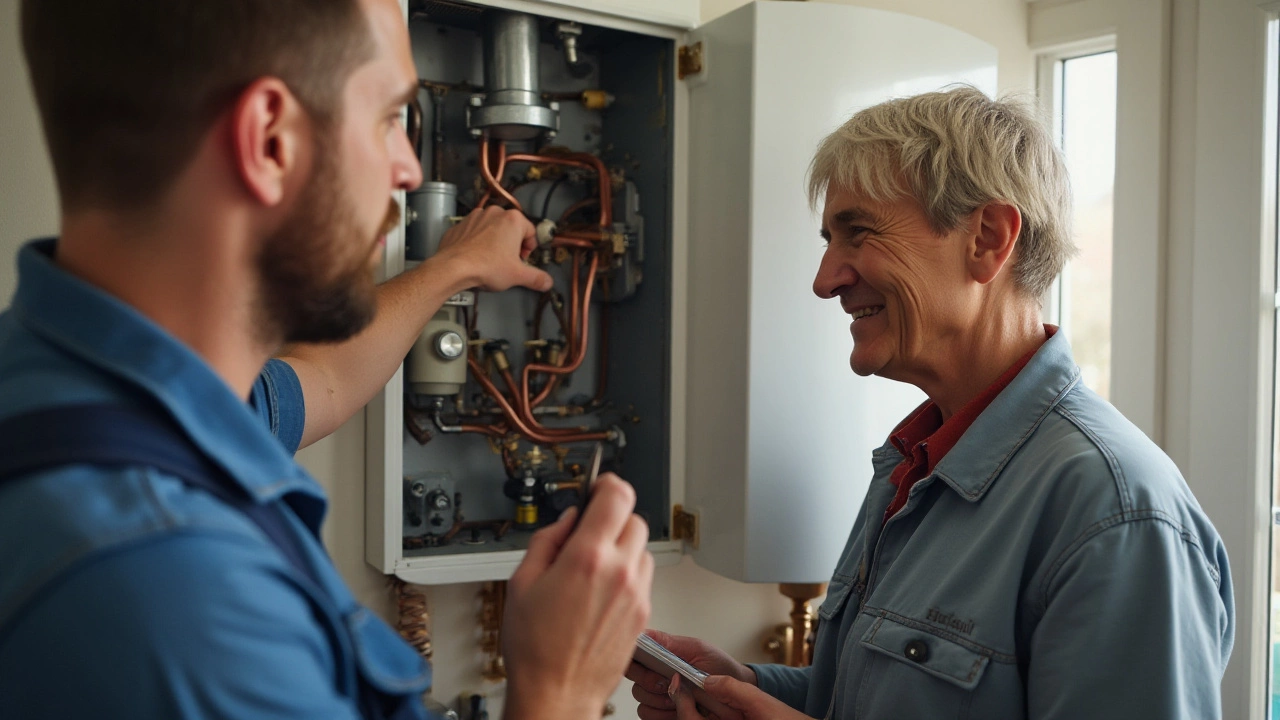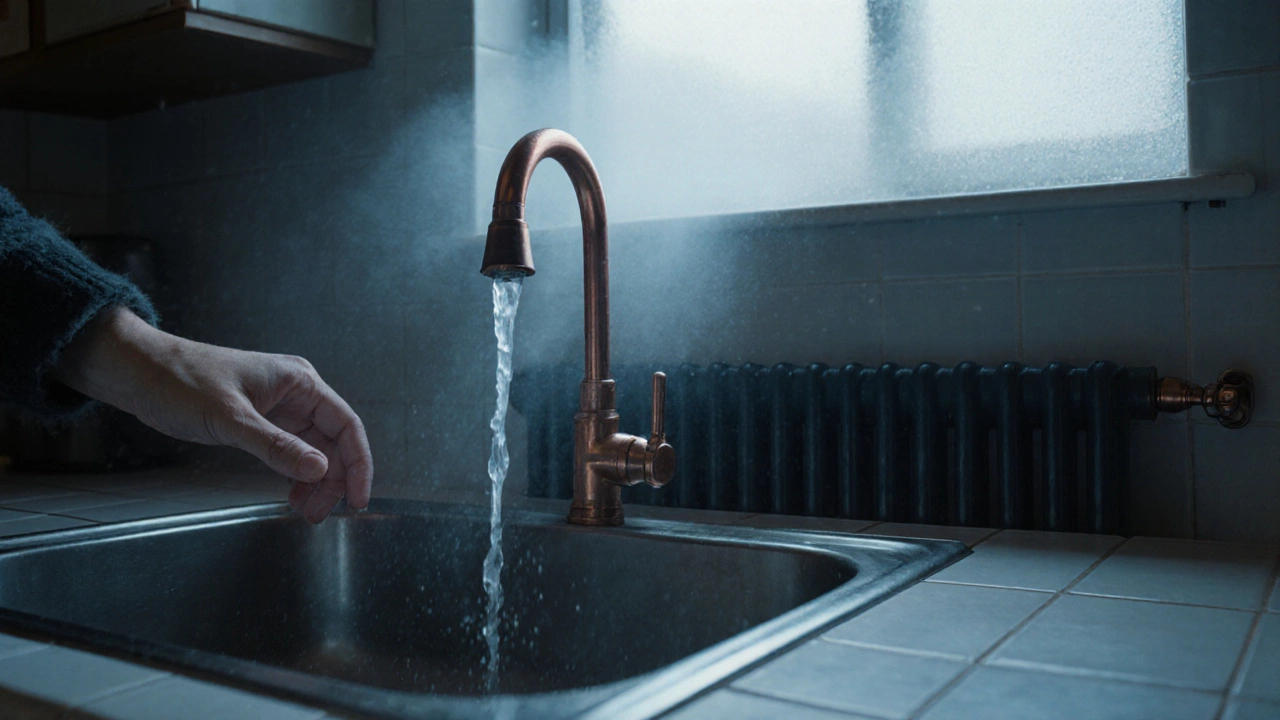
- 15 Dec 2024
- Gideon Thornton
- 0
As the winter chill sets in, a reliable boiler becomes the heart of a cozy home. But what happens when your boiler starts misbehaving? Recognizing early signs of trouble can help you avoid the discomfort of a freezing home and the headache of unexpected repair costs.
This guide will walk you through common symptoms and sounds that hint at issues with your boiler. From clanking noises to uneven heating, we'll cover what these may mean and how you might address them before calling in the experts.
Here, actionable tips will also be shared, aimed at maintaining your boiler's health, ensuring it stays reliable throughout the cold months. Read on to equip yourself with the knowledge needed to tackle boiler problems confidently.
- Common Signs of a Boiler Problem
- Strange Noises: What Do They Mean?
- Fluctuating Temperatures and Its Causes
- When to Call a Professional
- Tips for Preventing Boiler Issues
Common Signs of a Boiler Problem
When it comes to keeping your home warm and safe, the boiler plays a pivotal role, silently laboring behind the scenes. But like any hard-working appliance, it can develop issues over time. Recognizing the common signs that indicate something is amiss with your boiler can save you from the inconvenience of a complete breakdown. One of the telltale signs of a broken boiler is the unexpected appearance of cold spots throughout your home. This often indicates that the boiler isn’t distributing heat evenly, possibly due to a malfunctioning pump or air trapped in the radiators. Heating issues could also mean the thermostat isn’t communicating effectively with the unit, causing the boiler to not activate when needed.
A persistent pilot light that keeps going out is another red flag. Modern boilers typically have electronic ignition, so if your model includes a pilot light and it won’t stay lit, this could signal a fault in the thermocouple. This device senses heat from the pilot flame, and if it’s not working correctly, it may cut off the gas supply, causing the light to extinguish. Moreover, if you’ve noticed a significant increase in your energy bills without a corresponding rise in usage, it might be time to look at your boiler. A malfunctioning unit has to work harder to provide the same level of heat, consuming more fuel, and leading to higher costs.
“A boiler working overtime is akin to a car stuck in high gear on a quiet street – there's excess energy being used that shouldn’t be counting against you,” explains Susan Wallis, a senior engineer at a prominent HVAC firm.
Leaking is another significant symptom of a boiler issue. Any visible water surrounding your boiler should be addressed immediately. This could result from a variety of problems, from a corroded heat exchanger to damaged seals. Water leaks not only waste energy but can also lead to more extensive damage within the boiler, potentially causing structural damage to your home. Lastly, any peculiar noises emanating from the boiler such as whistling, banging, or gurgling often point toward air in the system, low water pressure, or even a failing pump. While these noises might seem trivial, they can be symptomatic of developing problems that require professional attention.
Taking the time to observe these signs can have a tremendous impact on your boiler’s longevity and efficiency. By being alert to these boiler repair signals, homeowners can act promptly, ensuring minor issues are resolved before escalating into major faults. This proactive approach not only protects the boiler’s lifespan but also keeps heating systems efficient, which is crucial for managing energy consumption during the chillier months.
Strange Noises: What Do They Mean?
Have you ever been jolted from your sleep by a mysterious clunking sound echoing through your home? If the culprit is your boiler, it's trying to tell you something. Boilers, though built to last and often silent companions, can become vocal when they start to experience issues. Knowing what these noises mean could save you from a day spent in the cold or a hefty repair bill. But all boiled down, noises are not merely ambient sounds; they're clues pointing to specific problems.
One of the most common sounds you might hear is a kettling noise. This noise resembles a kettle boiling, hence the name. It's often caused by a buildup of minerals in the heat exchanger. Over time, this accumulation of limescale restricts water flow, causing it to overheat and boil, which leads to the characteristic rumbling. This is particularly common in areas with hard water. Regular maintenance and the use of water softeners can help prevent such build-ups, safeguarding your heating system from lasting damage.
"Boilers should generally not produce any sound unless there's a serious underlying issue," says Jill Bailey, a renowned expert in home energy solutions.
An unexpected banging or clanging noise might tell a different story. This often happens when there are either air bubbles trapped within the system or a significant pressure difference. When air gets trapped, it changes how water flows through the pipes. Bleeding your radiators can often resolve these issues; however, continuous banging could point to a larger issue such as a faulty pump or motorized valve, which would require professional attention.
Whistling or a high-pitched squealing sound is another symptom that might send shivers down your spine, especially if you're unfamiliar with what it indicates. Often, this arises from a water pressure issue or a fault in the thermostat. Sometimes, simply checking the pressure gauge and adjusting accordingly can resolve the problem. More complex cases may involve replacing defective parts or recalibrating settings.
Persistent unusual noises are a red flag. Beyond the annoyance, they often hint at efficiency issues that can increase your heating costs unnecessarily. If addressed promptly, you can maintain the longevity and performance of your heating system, sparing your wallet and ensuring uninterrupted warmth. As with many mechanical systems, a little knowledge goes a long way in maintaining your comfort and peace of mind.

Fluctuating Temperatures and Its Causes
Imagine this: you've set the thermostat to a cozy level, yet one moment your home is sweltering, and the next you're reaching for a sweater. Erratic temperatures can be more than a simple nuisance; they often signal underlying problems with your boiler. This inconsistency in heat delivery can leave you perplexed, but understanding its root causes may just help you identify and solve the issue. The causes range from minor thermostat errors to significant system malfunctions that require professional attention. By knowing what to look out for, you might save on repair costs and significant discomfort during the cold seasons.
One of the most common culprits behind temperature swings is a malfunctioning thermostat. If it's getting its temperature readings wrong, it could be turning the boiler on and off at inappropriate times. It's worth checking if the thermostat is placed conveniently away from any heat sources like direct sunlight or other appliances. Often, a simple recalibration or replacement of the thermostat can resolve these irregularities. However, if the problem persists, there might be more complex issues at hand, such as problems with the boiler itself.
Another possible troublemaker could be the boiler's pressure. A drop in pressure can lead to insufficient heating, which might explain why you sometimes experience that unexpected chill. If you hear whooshing or gurgling sounds, it might indicate there's air trapped in the system, disrupting the balance required for stable heating. Bleeding your radiators can be a quick fix, but ensure to follow the manufacturer's instructions carefully or consult a heating specialist if you're unsure about this process.
Fluctuating heating levels might also arise from sediment buildup in the boiler system. This is more common in older systems or those that haven't been regularly serviced. The sediment can act like an insulator, preventing water from being effectively heated and causing uneven distribution. Regular maintenance, including flushing the system, can help prevent this accumulation. Some homeowners opt to add inhibitors to their systems to slow down the formation of sludge, ensuring the continued efficiency of their heating system.
Less apparent but equally impactful are issues related to the circulation pump. If the pump in the boiler isn't functioning correctly, the hot water might not be distributed evenly across your home. This misdistribution leads to some rooms being heated while others remain cold. It's essential to ensure that the circulating pump is working at its optimal capacity and is free from blockages. Sometimes, just adjusting the speed settings can make a noticeable difference.
A professional assessment might be necessary when these temperature fluctuations persist despite attempting basic fixes. In some cases, it could be wiser to have an experienced technician inspect your system to spot less visible faults such as issues within the piping or valve system. Investing in periodic professional check-ups can aid in ensuring that your boiler continues to operate with the highest efficiency.
"Keeping on top of boiler maintenance isn't just about comfort; it's about efficiency and safety," says Hannah Pierce, a seasoned heating engineer. Regular check-ups not only maintain optimal performance but also prolong the lifespan of your heating system, keeping energy bills predictable and manageable.
Staying mindful of these potential issues can significantly improve your winter heating experience. As you equip yourself with this knowledge, you're better prepared to tackle any sudden temperature shifts and maintain a comfortable home environment throughout the season.
When to Call a Professional
Experiencing boiler troubles can be daunting, especially if you’re unsure about what exactly is going wrong. While basic maintenance can be handled independently, certain situations scream for expertise. A key indicator that professional intervention is necessary is when the boiler simply doesn't start. If the heating system remains silent despite your attempts with the thermostat and basic troubleshooting, calling in an expert could save you from days or even weeks of cold discomfort. Often, this could be an issue as straightforward as a faulty ignition, but it requires someone who has a precise understanding of these complex systems to safely diagnose and fix the problem.
Another clear sign to call a professional is the presence of leaking. Water pooling around your boiler is never a good sign. It can lead to rust and extensive damage both to the boiler itself and potentially to elements of your home like flooring or electrical circuits. A professional can efficiently locate the source of the leak, which could stem from pressure issues or corrosion, and provide a safe and effective solution. Similarly, if you notice an unexplained increase in your energy bills, it suggests your boiler is working overtime, likely due to inefficiencies that need expert attention.
If your boiler emits strange noises such as banging, whistling, or gurgling, it’s time to reach out for help. These sounds can indicate a variety of issues including air in the system, low water pressure, or a faulty pump. Leaving this unchecked might result in a more extensive and expensive repair down the line. As noted by the HVAC experts at HomeServe, "Ignoring such signs can cause further damage, resulting in unexpected system failures at critical times." These professionals have the tools and training necessary to precisely diagnose these problems, ensuring that potential hazards are effectively mitigated.
Dangerous scenarios such as detecting the odor of gas around your boiler demand urgent professional attention. Gas leaks are not only hazardous to health but can also pose significant fire risks. In such a case, vacate the premises and immediately contact a qualified boiler technician. Additionally, an extinguished pilot light or constantly tripping circuit breaker are signs pointing towards internal issues requiring specialized knowledge to address safely and comprehensively.
Preventive maintenance is a strong line of defense against unexpected breakdowns and high repair costs. Many professionals offer annual service packages that thoroughly check your boiler system, ensuring all components function optimally. Regular professional maintenance can prolong the lifespan of your heating system, helping you avoid abrupt, inconvenient emergencies. If you are seeking reliability and peace of mind in your home's heating system, knowing when to call a professional is not just beneficial—it’s essential. This ensures you're not left in the cold but rather enjoying consistent warmth and comfort during those harsh, chilly months.

Tips for Preventing Boiler Issues
Keeping your boiler in top condition is no minor task, but with regular attention and care, you can prevent many common boiler repair problems. Start by scheduling an annual service with a qualified engineer. This yearly check-up not only ensures that all parts are functioning properly, but it also keeps your warranty valid, safeguarding your investment. An engineer will clean and inspect components like the burner, heat exchanger, and controls, which are prone to wear and tear. They can also identify early signs of potential issues, saving you from unexpected breakdowns when you least expect them.
Beyond professional inspections, homeowners can undertake basic maintenance that makes a difference. Air in the system can cause uneven heating. Regularly bleeding your radiators can alleviate this problem, ensuring that your heating is both efficient and consistent. Begin by turning your radiator key gently until air, and eventually water, starts to leak out. Close it swiftly to minimize mess, and always have a cloth ready to catch any drips. This simple task can greatly improve the circulation of heat throughout your home.
Water pressure is another crucial factor in a boiler’s performance. Most boilers operate optimally at a pressure of around 1 to 2 bars. Keeping an eye on the pressure gauge will help you spot deviations early. If the pressure drops too low or rises excessively, follow your manufacturer's instructions to re-pressurize the system. If you’re unsure how to do this safely, seeking professional advice is wise. Additionally, insulate your pipes, especially in poorly heated areas, to prevent freezing. This measure is particularly important during the winter months when temperatures plummet.
Ventilation is also vital for maintaining the well-being of your boiler. Ensure that the area surrounding your boiler is free from clutter. Boilers need adequate space to function correctly, and obstructions can lead to overheating or inefficiency. Avoid storing items directly next to or on top of your boiler. Allowing for air flow not only contributes to its operational efficiency but also prolongs the boiler's life span. Remember, a well-ventilated boiler is a happy boiler.
Maintaining your boiler might seem daunting at first, but it’s often a case of little and often. These preventative steps can considerably extend the life of your boiler. As the old saying goes, "a stitch in time saves nine." Implementing these simple measures will keep your home warm and your system running smoothly, saving inconvenience and expense. Consider them an investment in your home’s most vital system, ensuring comfort no matter how harsh the outdoor conditions.




